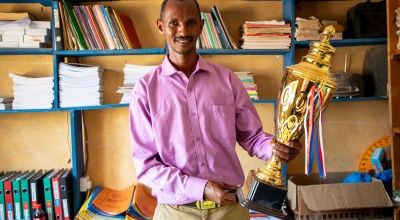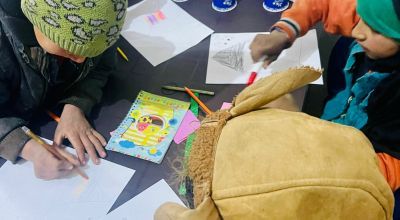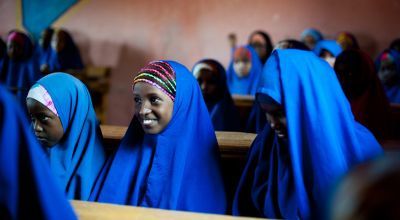
Read our 2024 annual report

Knowledge Hub
Among the countries where it’s hardest to get an education, Niger is especially challenging.
Historically, it’s often ranked last on the United Nations Development Programme’s Education Index.
Since the beginning of this decade, the situation has worsened. Five years of heightened insecurity in the Sahel have nearly doubled the number of school closures in the region. Niger is also an incredibly young country: 46% of its population is 14 or younger. Guaranteeing a basic quality education for younger generations could have a tremendous effect on Niger’s economy and poverty levels.
For a time, Niger had been making tremendous strides towards improving education. 50 years ago, just 11% of children in the country were in school. In 2019, nearly 78% of all children were enrolled.
A complex crisis
Then came 2020. While Niger was spared the worst of the COVID-19 pandemic, it was affected by the resulting economic crisis, as well as a deteriorating security situation in the region. The surge in violence led to mass displacement, with over half a million Nigeriens forced to flee by the end of 2024. This includes a high number of children.
These issues are felt in the classroom: Displacement for children means being uprooted from their friends, extended families, and schools. In 2023, school enrolment rates in Niger dropped to 58%. As of early 2024, 940 schools across the country had closed, leaving over 74,000 students out of class (along with nearly 1,800 teachers).
The situation has worsened in 2025: As of April this year, 1,097 schools were closed in the Tillabéry region alone. This has led to over 93,000 children out of school without any alternatives, and therefore more exposed to the risks of joining armed groups, entering into child marriage, or other forms of exploitation.
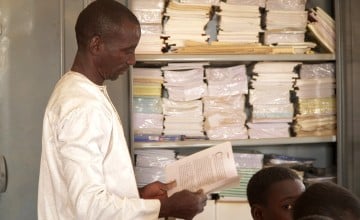
Struggling to keep up
These effects were felt at one school in Tahoua, the region just east of Tillabéry. “Prior to Concern’s involvement, the school had a low enrollment,” says Ibrahim*, principal of the school, which teaches kindergarten and primary classes. It also offers bridge classes, set up to help children who have lost parts of their schooling due to displacement catch up and re-enter the formal education system.
Despite this commitment to education, it can be hard for children to keep up. Many in the bridge classes have survived attacks, arriving in Tahoua from other parts of the country. Others aren’t enrolled at all, owing to a lack of supplies or capacity — or a fear on the part of parents who feel that it’s safer to keep their children close to home.
“The school lacked classrooms,” adds Musa*, a member of the school’s parents’ association. “Children were learning in straw huts. During the winter, it became difficult for them to attend classes.”
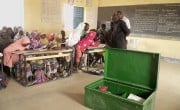

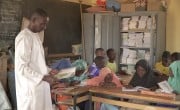
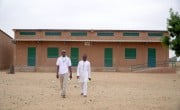
Learning together
Concern has worked in Niger since 2003. We also have decades of experience with providing education in emergency settings, including communities affected by lockdowns. Through increasingly complex challenges, we’ve found ways to still provide children with consistent curriculums as well as the psychosocial support to continue learning even in impossible circumstances.
As part of our education programming in Niger, we knew we had to respond to the rising crisis in classrooms, particularly in Tillabéry and Tahoua. Taken together, these two western regions account for more than two-thirds of all internally-displaced Nigeriens — and over 78% of all child IDPs. These early years are critical not only for intellectual development, but also social and emotional — and they can have a lifetime of impact.
We began “Learning Together” in October 2020 as an initiative to support 250 formal schools, with a total of 71,000 children. By supporting these children with uninterrupted access to quality education, we hoped to strengthen social ties and improve their overall well-being.
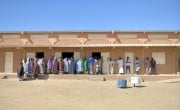
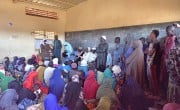
Bringing in the basics
“Concern intervened here when we needed it the most,” says Seydou*, a preschool and primary education inspector in Tillabéry. “The programme coincided with the security situation, when schools were closed and there was an influx of children moving to safer schools.”
Seydou’s town was one of the safer areas, but it wasn’t prepared for so many new students. Among the first initiatives we took on with Learning Together was to ensure that there was enough space and supplies for students. We provided tens of thousands of textbooks and recreational kits to students, including materials that could help those in bridge classes catch up in an appropriate way. We also rehabilitated and at times constructed more than 213 school facilities for 62 schools.
“They brought us wheelbarrows, dustbins, and brooms,” Aaminata*, a young pupil, lists off as she surveys the courtyard. “They built latrines. Our French and Arabic classes have also improved.”
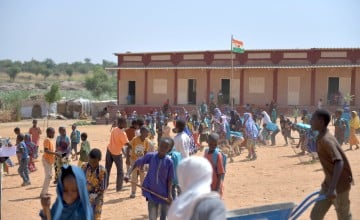
Helping the helpers
Concern brought trauma-informed approaches into these classrooms. We worked with teachers and educational supervisors to develop safe learning environments that anticipated the needs of children — many of whom have firsthand experiences of conflict and violence.
At the community level, we also built an important partnership with parents’ groups. “We developed an approach that consisted of building their capacities to make them more autonomous,” says Learning Together project coordinator Aissata Abatcha.
“Concern has supported all of the School Management Committees,” adds Seydou. “It has trained them, revitalised them, and even supported their action plans.”

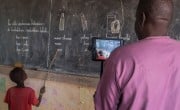

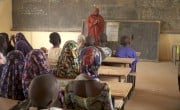
“They are now able to draw up and implement plans for their schools themselves. This ensures a certain degree of sustainability: At the end of the project, the community structures are in place to carry out the activities,” notes Abatcha.
We also worked with teachers to ensure they had the support they needed to continue their work. Part of Learning Together included a distance video-coaching initiative. Concern provided teachers with tablets and accessories to film two classes each month, which were then shared with trained pedagogical advisors (PAs) for feedback. The teachers worked together to implement these suggestions each month, improving educational outcomes for over 7,100 of their students.
“These are real pedagogical innovations,” says Usman*, another education inspector in the Tahoua region. “In the past we didn’t do this, but now we have the equipment that enables us to follow our teachers in the classroom, even remotely.”
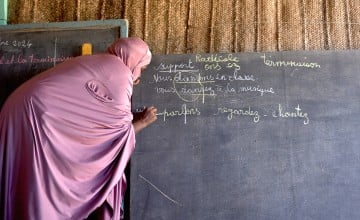
Getting kids back in the classroom
Ibrahim’s school in Tahoua has been seeing the results of Learning Together. “Classrooms have been built with solid materials and equipped with desks and supplies,” says Musa, from the school’s parents’ association. “Learning is going better now as a result.”
This has led to the school having a total of 716 pupils in the last academic year. Eager pupils, too: “Thanks to Concern’s support, our learning has been going well,” says student Hassan*. “All of the kids love coming to school.”
“Children are in environments that are conducive to learning,” adds Ibrahim. “They have an easy time with learning to read, write, and do arithmetic, and this in turn motivates parents to enrol their children at this school.”
This includes students who have needed an extra hand to catch up. Over 6,300 students re-entered the formal education system via Learning Together-supported bridge classes, with a 92% completion rate. “We know that some of these children have been out of school for several years. This approach has really helped to raise children's reading levels,” says Seydou.
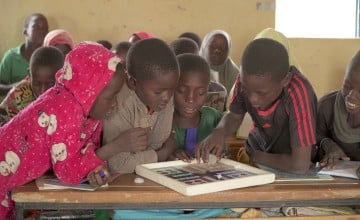
Bringing the classroom to the kids
In Niger, many classrooms are still not ready for children to return. In these areas, Concern turned to a format we’ve used in the past: audio lessons.
Audio-based education has been used for roughly a century and has a proven track record in effectiveness. At Concern, we saw tremendous success with the programme during the 2014-16 Ebola epidemic. The technology is more reliable and accessible than the internet. During the height of COVID lockdowns, audio courses kept 58% of all students around the globe.
Working with Niger’s Ministry of Education, Concern developed an interactive audio distance learning programme. The programme covered a seven-month curriculum and reached 3,000 out-of-school children in conflict-affected areas where schools had been closed. We rolled out these lessons through over 117 listening clubs, each of which brought children together with trained facilitators and helped to build social cohesion even in areas with restricted movement.

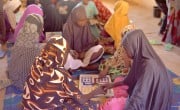
Making the grade for 75,000 students
In the end, Learning Together reached over 75,000 students. We worked with two regional directorates of national education and 12 inspectorates to improve approaches to education in emergency contexts, and strengthened over 250 community structures to ensure that these approaches continue to thrive.
However, this isn’t the full story: In Niger, needs have only increased for education over the last few years. More people are being displaced (with roughly a 25% increase in the last year), and while the approaches tested with Learning Together can be scaled-up, humanitarian funding has fallen far short of its targets in recent years.
There’s a lot more we can do. One thing we can’t do is go back.
Education in Niger: Your concern in action
Learning Together is one aspect of Concern’s commitment to improving access to quality education in Niger, and it’s one we’re currently hoping to expand. We’re prepared to ensure continuity of learning through audio lessons and listening clubs, increasing local school capacity, and working with teachers to give them the professional tools and support they need.
We’re also ready to work with thousands more children ages on re-entering the formal education system and provide psychosocial support for those who have experienced the harsh effects of this ongoing security crisis — while also working with communities to strengthen resilience and cohesion to ensure that no one is left behind. Your support can help us to do that.


